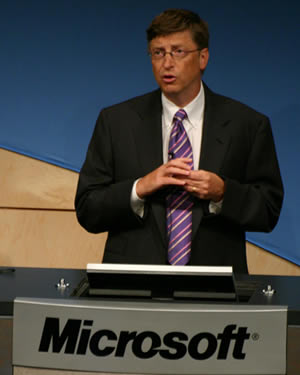Gates Vs Edison
1. Page 1
Those who compare Bill Gates with the early twentieth century tycoon John D. Rockefeller are many. These two men made their fortunes by exclusively exploiting a key-industry; both were accused of illicit business conduct; both launched fiery battles against the USA federal government to keep up their monopolies.
 Such a comparison is not quite right maintains the historian of technology Tom Standage in an article of his in the Feed magazine, under the title “what Great Bill can learn from uncle Thomas Alva”. It makes more sense to compare Bill Gates with another great figure of the last century, Thomas Alva Edison.
Such a comparison is not quite right maintains the historian of technology Tom Standage in an article of his in the Feed magazine, under the title “what Great Bill can learn from uncle Thomas Alva”. It makes more sense to compare Bill Gates with another great figure of the last century, Thomas Alva Edison.
More than a century ago, Edison set the technology patterns of his era and was acknowledged as the most famous technologist of the century. Yet, it is Edison’s dark side (the one we are not taught at schools, the ruthless means he employed to crash his rivals and become the absolute master of numerous markets) that has a lot in common with Gates.
Both experienced a premature adolescence and had the ability to anticipate any market norms before they were even created. Both set off making use of other people’s inventions. Edison made a fortune improving the operation of machines invented by others, while Gates accomplishments were initiated when he started selling the MS-DOS that had been produced by people other than him. Both got married to ex-employees of theirs, they paid little attention to their looks and were never trapped in the luring temptations lying in their riches.
However, what bears the most striking sameness can be found in their business practices. Like Gates, who missed the Internet revolution and has today launched a virulent attack to impose his own patents, Tomas Edison missed the chance of becoming part of the alternating current revolution. He had set his horses after the direct current, and when the world was presented with Nicholas Tesla’s alternating one, the kind of electric current that could be carried over long distances without any losses whatsoever, Edison set out on a marketing and public relations war that knew no ethical bounds.













